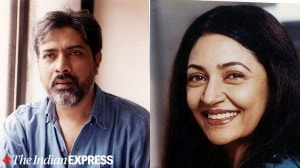The playing field: Maken vs ministers
Proposed Sports Bill was opposed by a group of ministers at a Cabinet meeting earlier this week.
The proposed National Sports Development Bill 2011 was opposed by a group of senior ministers at a meeting of the Union Cabinet earlier this week. Swaraj Thapa explains the areas of differences.
Government control
Section 6(1) of the Bill makes it mandatory for government approval to be taken by national sports federations,barring those which do not avail of grant-in aid from government,for its long-term development plan spanning over four years. The clause says: every national sports federation shall,in collaboration with the Sports Authority of India and with the approval of the central government,develop a long-term development plan for a period of four years in accordance with the guidelines specified.
Sports Minister Ajay Maken says he is not insistent on mandatory government approval,but points out that some interlinking should be there as the government,which funds the sports federations,has a right to know how its money is being spent.
National Sports Development Council
A National Sports Development Council proposed under the Bill will have authority to allot certification of registration to national sports federations. Its chairman and members will be appointed by the central government. They can be removed if they refuse to act or if the government comes to the opinion that he or she has abused his position.
Maken says that the Council is not new. He contends that the registration process has been made easier in the Bill. At present,national sports federations have to annually renew their registration from the Sports Ministry. Under the new regime,it will not be an annual exercise. He also adds that he is willing to withdraw any provision that smacks of government control,including that of appointments.
Further,Section 12 (2) (c) says the Indian Olympic Association will be responsible for all matters pertaining to bidding for Olympic Games or Asian Games or Commonwealth Games or Afro Asian Games or South Asian Games or any other multi-sports event,as may be approved by the central government,and comply with the conditions,if any,mentioned therein in the approval. This provision appears to have been included as a consequence of the CWG scam.
Maken says he is willing to consider removal of government approval clause. But says there should not be opposition to Section 13 (1) which says IOA shall submit annually a detailed report to the central government for causing it to be laid before each House of Parliament.
Transparency
The Bill proposes a model election code that prescribes elections through secret ballot for all national sports federations,instead of the present system through voice vote. The byelaws that were prepared by former sports minister M S Gill in consultation with the Election Commission proposes that election rolls must be put up on the website one month before; a retired High Court judge must be returning officer and the election process must be videographed.
BCCI under RTI
Ministers heading state cricketing bodies opposed this clause. Section 15(f) of the Bill says that every national sports federation shall function as a public authority and comply with the requirements specified in the Right to Information Act,2005. Further sub-section (i) says that every national sports federation shall publish on its website its audited annual financial statements every year before December 31. Sub-section (iv) says the national sports federations should also publish on its website measures taken to eliminate corruption,doping,age fraud and sexual harassment of women in sports.
Maken refuses to relent on this clause. Says BCCI has taken indirect financial support in the form of IT exemption for its matches,free police security,free cricket grounds and other facilities. It also uses the India logo,representing the country,so the public have a right to demand transparency and accountability in its affairs.
Age,tenure limit
Section 42 (1) (a) says every office-bearer of a national sports federation and the National Olympic Committee shall retire on attaining the age of 70 years. Section 42 (1) (f) (vi) says he shall not be eligible to re-contest for the post of president on completion of 12 years or three terms of office of four years each in that office with or without break.
Maken refuses to compromise on these clauses. Says no justification in continuing beyond 70 years when the bureaucracy and judiciary too have age limits.
Vested Interests
Section 42 (4) bars the Union Sports Minister,Union Sports Ministry officials or any officer of the Sports Authority of India from contesting any elected post in the National Olympic Committee or a national sports federation until the expiry of five years from the date of relinquishing charge or retirement. Earlier,former bureaucrat K P S Gill became Indian Hockey Federation chief soon after his retirement; former sports minister Vikram Verma went on to head the Badminton Federation.
Section 42 (5) further says no office-bearer of a national sports federation shall be eligible to concurrently hold the post of an office-bearer in any other national sports federation. BJP youth leader Anurag Thakur is the president of the state cricket association,hockey association,Kho Kho association and Olympic association at present.
Section 42 (6) further says an office-bearer of a national sports federation who has completed one term shall not be eligible to contest for the post of an office-bearer in another national sports federation without meeting the cooling-off period requirement of four years. Both Abhay Chautala and Ajay Chautala have interchanged between the Haryana Boxing federation and the state Table Tennis Federation so that they are not charged with holding one post permanently.
Sports Lokpal
The Bill makes a new provision for its own national sports ombudsman whose aim will be to mediate or conciliate disputes. The eligibility criteria will be the same as that for a judge.
Sports Tribunal
A provision has been made for a separate Sports Dispute Settlement and Appellate Tribunal to adjudicate disputes among office-bearers of a national sports federation; between two national sports federations; between athletes and a national sports federation; and between sponsors and a national sports federation. The appointment of a chairperson will be through a committee headed by the Chief Justice of India. The BCCI will also come under its purview. Section 58 (1) further says all civil cases in which national sports federations and the Indian Olympic Association have been impleaded a party and pending for adjudication of dispute before any court (other than High Court and Supreme court) must be transferred to the Appellate Tribunal.
Photos



- 01
- 02
- 03
- 04
- 05




























